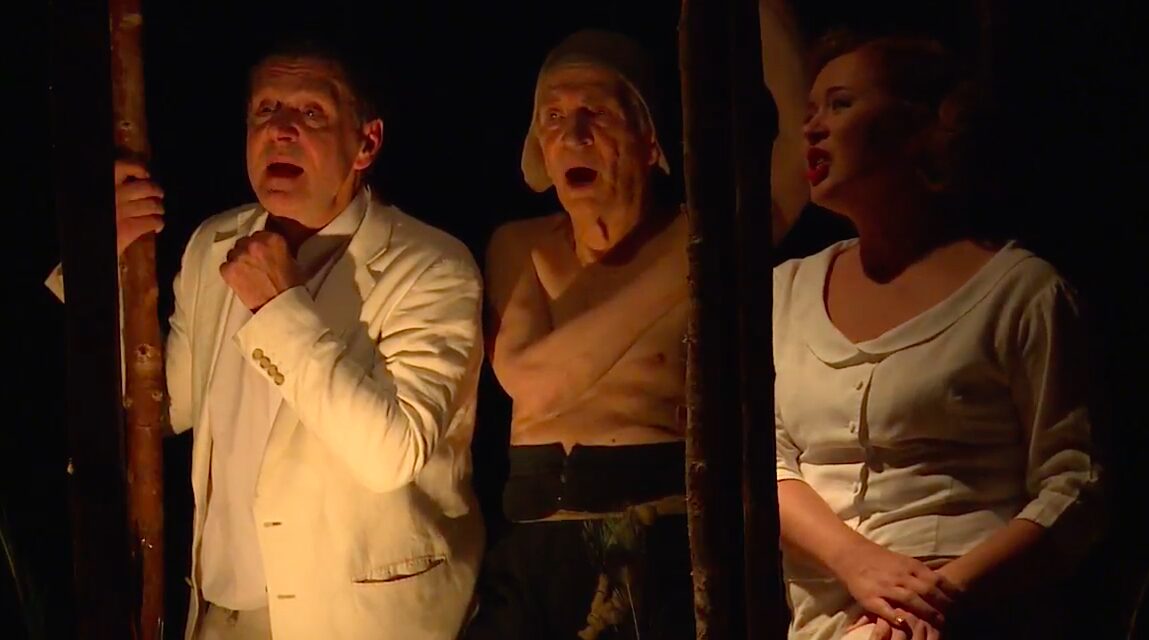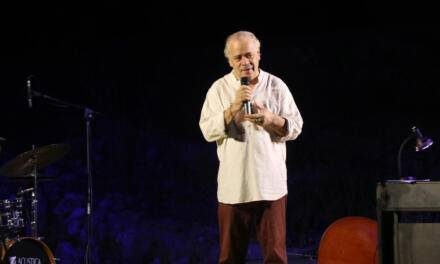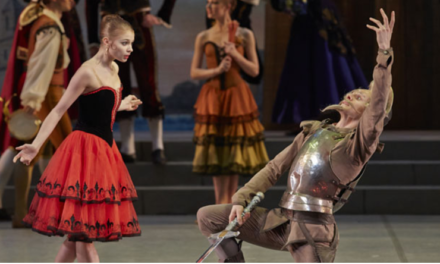Excerpted and adapted from the book Provoking Theater: Kama Ginkas Directs by Kama Ginkas and John Freedman (Smith and Kraus, 2003). It is reposted here with permission.
ON CHEKHOV
My first attempt at staging documentary materials was in 1968. It was a play called My Mocking Happiness, based on the correspondence of Anton Chekhov with various people. Written by Leonid Malyugin, a writer who was quite popular at that time among intellectuals, it was a very bad play constructed on the basis of badly edited letters. Basically, he wrote a piece of sentimental slop, a portrait of Chekhov as if he had been an exemplary Soviet citizen. He went to live in the country and then traveled to Sakhalin Island to find out how strong-spirited people live. He was the kind of person who did not accept the tsarist regime, but he fell in love with the famous actress Olga Knipper, became involved with a good theater, the Moscow Art Theater, met “the stormy petrel” Maxim Gorky, and then, finally saw the light. Still, he was a lonely man and he died when he got sick. It was a banal version of the loves and works of Anton Chekhov. I was not at all interested in that. I did not give a damn about Chekhov’s first love or his second love. I rewrote the whole thing. All I left untouched were the characters’ dialogues and the basic plot based on historical facts.
I went back to a pre-revolutionary edition of Chekhov’s letters in five volumes and re-read them all. That was when I realized that all the quotes in the play were inaccurate. They often broke off right when the most interesting thing was about to be said; something that would transform what Chekhov had been saying up to then into something else. I left the basic structure of the play intact, but filled it out with quotes from Chekhov’s actual letters and threw out everything Malyugin had inserted on his own.
It was then that I first realized the tragedy of Chekhov’s nature. I discovered the paradoxes that existed inside of him and the breach between others’ perceptions of him and his own perception of himself. This breach existed even with people who loved him. I discovered the paradoxes that affect any person in Russia who dedicates himself to art. Perhaps that stands true not only for Russians, but it is especially true of Russians.
Essentially, Chekhov wholly renounced himself, declining to have a personal life. And I began to understand that that “old man” who died at the age of forty-four was no old man at all. I was used to judging him by his photographs which make him look like an old man. In fact, he was a passionate man. As all in the Chekhov family, he was an alcoholic by inheritance. That is, he was not an actual alcoholic because he did not allow himself to become one. But his brother Alexander was an alcoholic and his brother Mikhail died of alcoholism and tuberculosis. That was hereditary. Anton was in the same position, but he did not allow it to control him.
He was a tall, handsome man with a great sense of humor. He was charming, a great ladies’ man. He adored women. And, yet, he avoided them, too. Chekhov rarely talked about himself, but if you know how to read him, you will see that he loved plump women with tough characters. He was not interested in elegant women, no.
He had a famous affair with a well-known provincial actress whom he described, in part, in the character of Arkadina. This woman often created public scenes. She was capable, at a society gathering, of falling down before Chekhov on her knees and declaring, “Oh, great writer of the Russian land! How I love you!” He hated the theater and theater life with all its vulgar scenes. And yet, this affair lasted several years. Because, even as he hated this crude, vulgar behavior, he was drawn to it.
Our impression of Chekhov is that he was a very proper person. But he was actually capable of being very explosive. Admirers would travel to visit Chekhov at his home in Melikhovo. Teachers, usually associated with liberal populist groups, would come and ask him how to educate children or how to improve the life of poor Russians. He hated all those populists and social progressives! He saw their superficiality, how badly educated they were. Yes, they were devoted to their cause, but he saw how vain they were about their virtue. Chekhov was unwell, he wanted to write. But these people would sit there for hours, talking and asking him questions. One time, he began smashing plates and yelling at his sister, who was in charge of the house. Couldn’t she possibly find a way to protect him from these intrusions?
When I did My Mocking Happiness, I took my actors to the Chekhov museum at Melikhovo. One thing that amazed me among the exhibits was a big beret. The tour guides told me that Chekhov had terrible migraine headaches. He would literally yell from the pain. The beret was a method for easing the discomfort. They would put out a basin and fill it with hot or cold water, I do not remember which now. He would put his feet in the basin and, instead of pressing a towel to his forehead, would put on that extremely tight beret which would squeeze his head. And he would sit like that for hours.
Imagine Anton Chekhov sitting there with his feet in that basin of water and his head in that beret. That is a completely different person from what we know. This is not the man we see in the crisp white shirt with his hair combed perfectly.
ON TENDERNESS AND IRONY IN THE BLACK MONK
...When I create my shows, I perceive them as gentle, tender and ironic. I do not know how spectators perceive them, but that is how I perceive them. [In] The Black Monk, the notion of playfulness is very prominent. It is the deception of a child….
As the author of the production, I recognize and know the abyss facing Kovrin. I am convinced that it presents a mortal danger. But that is another thing. …In this show, the intonation characterizing the speech of Tanya might be that of a cheerful mother: “Oops, careful there Kovrin. You don’t want to fall, now. That is the edge of an abyss there, you know. It is quite a drop. Who knows what’s out there? Oops, careful there Kovrin. You don’t want to fall, now. That is the edge of an abyss there, you know. It is quite a drop. Who knows what’s out there? Maybe you’d better come away from the edge and play with the fluffy feathers over here. Dabble about in love and conversation. Why not come away from there? And what’s the difference in distance? A meter. No more. That is all.”
ON LIGHTING IN THE BLACK MONK
I may use footlights, only not as they usually are used in the theater. For example, I use them in The Black Monk.
Why do you think you have such a strong sensation of the peacock feathers in that show? It is because they are illuminated from below. In fact, the lighting there is established not so much to illuminate the actors as it is to fall on the field of feathers. Of course, the light also catches the underside of the actors’ chins, the upper arches of their eyes, their nostrils and so forth.
In the theatrical tradition, this is infernal lighting. In the opera when the devil used to appear from a trap door, he was lit from below. Yury Lyubimov often uses an expressive lighting from below.
In The Black Monk, I use it in a way that is devoid of special effects. It imparts a strangeness because it is neither the usual theatrical lighting from above, nor is it the infernal lighting. Its function is to give texture to the field of feathers rather than illuminating the actors. The feathers, in fact, cast shadows on the actors above them. So this lighting is very different from what we are accustomed to in the theater.
GINKAS ON HIS OWN PRESENCE IN THE BLACK MONK
As a rule, the music in my shows is me. It is my voice. It leads and provides direction, and it offers a view, as it were, from neutral territory — an objective view. Music provides something of a cosmic or divine view. Perhaps I would be better off just calling it the point of view of a “certain power.”
Of course, I exist outside of the show; I do not take part in it. I am not the gardener or a neighbor or the groom in The Black Monk. Who am I? I am an ephemeral presence who is fascinated by what is transpiring. I arranged a whole series of provocative acts in order to see how they might help me understand who these people are and what is occurring among them. I am like the guy who pokes a fly with a needle to see how it will wiggle its legs. I am curious to see what will happen if I bring my fly closer to a candle flame or if I dunk it under water and let it rise to the surface.
ON THE VALUE OF LIMITATIONS IN ART
…There is no such thing in art as just doing whatever you want. If you, as a director, do not have an author setting limits for you, then you yourself set the laws you must abide by. These laws are inviolable. The laws you establish for yourself and which you accept of your own free will, ultimately, are what make art of what you do. This is what I tell my students: “Obstacles are our saviors.” If you have no obstacles, no limitations, then you must find them. Man is not man without obstacles. It is in the overcoming of obstacles that character, both in life and in theater, is revealed.
Anything is possible in the theater and spectators know that. You can make a hole in the stage, add a paper flame and a figure in black and there you have a devil. That will not surprise anyone at all. But that is the whole point. My job is to find a way to surprise and frighten you when my devil appears. My job is to make that a terrible experience, as it would be in actual fact.
You must create laws that limit you. You must establish theatrical taboos which, in turn, force you to overcome them. And you must make the spectator aware of these laws so that they exist within their bounds as well. When they feel that law acting upon them, or they sense you attempting to overcome it, that is when you get spectators shivering with goosebumps. On one hand, the spectator knows it is all make-believe. On the other hand, he begins to accept the set of rules you have established for the show.
In The Black Monk, the spectators enter and take their seats on the balcony where a stage has been erected. They look out over the empty orchestra and see the theater’s empty stage down below. They think nothing of it. A stage like any other stage. This is a theater, after all. Then the action begins to unfold up here, in the limited area on the balcony that I have set aside for the performance. Then the spectator becomes caught up in this specific space. He
forgets about everything else. But, after awhile, something suddenly happens down there on the actual stage. And you can feel the spark, the tension ripple through the crowd.
What happened? Nothing of importance at all, really. But the spectators’ attention had become concentrated on what was happening here on the balcony. The scope of their visual and psychological awareness was limited to this space alone. Suddenly, way down there, far away, something happened.
Some spectators have told me this is a moment of cosmic proportions. Because they came to accept the small world on the balcony as a representation of the earth, while the space down on the empty stage seemed to them an approximation of outer space. Thus, the interior of the theater took on the dimensions of the universe.
I created this effect quite consciously. I knew the spectators would exist in this small, limited space on the balcony and would grow used to it. So, when I gave them something to respond to some thirty feet away, the difference strikes them as enormous. That is a natural, human, psychological reaction.
Laws and limitations are essential. You establish them for yourself. If you are a poet, you say, “I will write in five-foot iambs.” Why would you do this? Because that is where art comes in. But look what Akhmatova does — she holds strictly to the meter right to the end and then suddenly breaks out of it. It is a shock, a gulp of fresh air!
Or a poet starts out writing trochaic verse and suddenly, in the middle somewhere, switches over to iambs. You are thrown out of your rut! Big deal, right? It would seem nothing really happened at all. But, no! That is a change that you feel physiologically, with your whole being.
ON SUBMISSION AND AMBITION
Take, for example, the year 1981, just prior to my being invited to Moscow to stage Five Corners. By this time I had essentially abandoned my profession. I had had no professional productions for three years and had done little more than take my dog for walks. You would think I would recall this period now with horror, but it comes back to me as a period of calm. I assumed I had merely made a mistake; that my father was right and it was folly for me to think
of a life in the theater. Apparently, in my pride and vanity, I merely imagined that I was someone. Now, I thought, I could see I had been wrong. There was nothing painful about it. It was a period of resignation. I became resigned to
the fact that—as Kovrin says in The Black Monk—I was a mediocrity. Kovrin insists that he must be satisfied with his mediocrity. And he is. Because every person should be satisfied with what he is. It is a terrifying thought—that you should have no ambitions to be more than what you are! That you must be satisfied with what you are. It is a tragic thought. One steeped in wisdom, but terrible nonetheless.
I always tell my actor Sergei Makovetsky to break that line into pieces: “Everyone—must. Be. Satisfied.” Period.
A person must be satisfied. That means if you are, you have no choice but to be satisfied that you exist. Even if you are small and insignificant. But that is what you are, so be satisfied with it. You are bound to be grateful to God or to whomever or whatever, for that trifling little that has been given you.
It is horrible. But you must admit it is true. That is resignation, acquiescence. It is meekness, a key quality of Christianity. “To submit”—that is a verb of extraordinary width and depth.
So there I was: I had had creative ambitions. I had thought I was different from others in some way, in my creative powers. But it seems I had been wrong. I became resigned. I grew calm and took my dog for walks. I sat on park benches and talked with old ladies. There was nothing strange about it. I was not yet forty but I felt as though I was just like the old women I talked to. I still had a certain number of years left to live, but that is the way everyone lives. You can live like that. I wondered why it was that I used to think I should live some other way as if I were different.
There was something I did not formulate for myself at the time, but which I felt deep inside me very clearly. Chekhov has a way of identifying the most gloomy, tragic and, at the same time, wise thoughts. In The Lady with the Lapdog, after a problem has been resolved, there is a phrase something like, “But there is a long, long life ahead to live.” In another work, I cannot remember which right now, Chekhov writes, “there are another twenty years to live.” In other words, what a long, long time left to live.
When you have a goal, when you are engaged creatively — and I do not mean only theater or literature — when you are busy doing something, creating something, then you are alive. And it seems that this time is short. But without that, imagine living twenty years! Twenty years of nothing! That is a terribly long time. Chekhov pinpointed that with fantastic, terrifying precision.
I came to understand that myself. I was not yet forty. My ambitions had come to an end. And I would live out my long years like everyone else. I did not quite understand how I would do it. But I assumed that every day I would have to do something. Walk the dog. Sit and wait. A long time. A half hour. Talk with an old woman or a drunk. Sweep the floor. Do something to earn a little money. In other words, do what 99% of humanity does. This did not strike me as anything terrible. I entered into it calmly. And I believe this is when I was actually reborn.
This post was written by the author in their personal capacity.The opinions expressed in this article are the author’s own and do not reflect the view of The Theatre Times, their staff or collaborators.
This post was written by Kama Ginkas and John Freedman.
The views expressed here belong to the author and do not necessarily reflect our views and opinions.


















